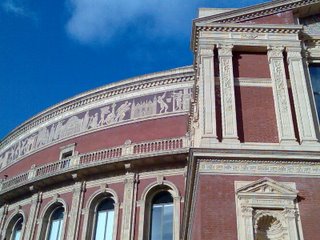At the Albert Hall

Last evening, I attended a concert by the Royal Philharmonic Orchestra at the Albert Hall with someone from class. We certainly had a nice time there. On the menu were selections from Grieg's Peer Gynt Suites, plus Rachmaninov's Rhapsody on a Theme by Paganini, and Dvořák's Symphony No. 9, "From the New World." These were three very popular and accessible works from the classical repertoire.
The Albert Hall was amazing. It's probably one of London's - and perhaps the world's - most reognizable performance venue. I had only seen its resplendent interior on TV, and this was my first time stepping into it. Red was the predominant colour, and the interior furnishings still retained its essential Victorian character.
Indeed, the area around the Albert Hall - South Kensington - was home to many great Victorian era institutions and buildings. Opposite the Albert Hall was the Albert Memorial, dedicated to the Prince Albert, consort to Queen Victoria. Nearby, one could find august institutions such as the Victoria and Albert Museum, the Natural History Museum, Imperial College, the Royal College of Music and the Royal Geographical Society.
Last evening also represented my first foray into learning more about London's rich orchestral offerings. I may be somewhat familiar with classical music, but knew little about the orchestral music scene in the city. Besides the RPO at the Albert Hall, London's also home to other top-ranked full orchestras, including the Philharmonia and the London Philharmonic Orchestra, both of which are based at the Royal Festival Hall, the London Symphony Orchestra, based at the Barbican, plus the BBC Symphony Orchestra, which performs each year at the famous summer Prom concerts. What a thrilling cultural line up. And this even excludes the other chamber and operatic groups out there.
I felt all three works last evening were executed pretty competently. It wasn't exactly a revelatory performance, but I guess you'd get that only once in a lifetime. The Rachmaninov Variations was given a pretty lyrical rendition by pianist Alain Lefèvre, who was also technically very accomplished. Playing from memory, he didn't get a single note wrong.
But there was something else from the performance that troubled me. No, it wasn't the incessant coughing that came from assorted audience members. Nor was it the less than overwhelming volume of the music - a problem to do with the acoustics of the hall. In general, I did enjoy myself thoroughly.
Rather, there was this strange habit of audience applause in between the movements of a complete work. Incredible. Has the convention changed? Shouldn't we clap only when the entire work has been completed? We began with four short extracts from Peer Gynt - each lasting for at most four or five minutes, and they were all followed by enthusiastic clapping. There was clapping after each of the Dvořák movements. There was even some attempt at clapping after one of the variations in the Rachmaninov work.
I found these moments of applause entirely inappropriate and somewhat irritating. You're meant to enjoy a work in its entirety, and not interrupt the orchestra with your commentary until they have finished their delivery. This wasn't a comedy routine or a speech, where you'd punctuate the delivery to signify your approval.
I have my own theory as to why we saw what we did. Of course, it's totally unscientific, drawn only from my inductive observations. But I think the habit of clapping in between movements reflects two trends; first, the move towards a compartmentalization of classical music, where we now take in these great works of the past in bite-sized bits, rather than as sublime, sustained masterpieces. (The Classic FM station in the UK has been charged with helping to lead this movement.) This in turn reflects, perhaps, the steadily dwindling levels of patience we now find in modern life.
Second, the clapping habit could also be a function of increasing self-focus and self-absorption - which is also related to modern living. The sensibility that proclaims, "Look, I've paid for this ticket. I'm here to enjoy myself. If I like the music, I'm going to clap, and there's nothing that should stop me. Wait till the very end of the 45 minute work to applaud? You've gotta be kidding." So out goes notions of convention, class or decorum.
In any case, we left the Albert Hall at about 9.30pm, and found out way to Old Brompton Road by about 10.00pm, where we had dinner at nice restaurant Bella Italia - probably one of few places that was still accepting diners at that late hour. It was a very convivial evening, with pasta and coffee. Good food, good conversation, and wonderful company. All in all, a very nice night out.

0 Comments:
Post a Comment
<< Home